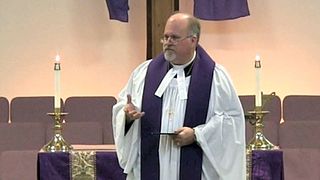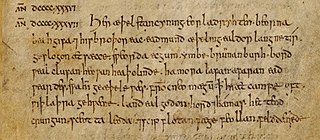Old English, or Anglo-Saxon, is the earliest recorded form of the English language, spoken in England and southern and eastern Scotland in the early Middle Ages. It developed from the languages brought to Great Britain by Anglo-Saxon settlers in the mid-5th century, and the first Old English literary works date from the mid-7th century. After the Norman conquest of 1066, English was replaced, for a time, by Anglo-Norman as the language of the upper classes. This is regarded as marking the end of the Old English era, since during this period the English language was heavily influenced by Anglo-Norman, developing into a phase known now as Middle English in England and Early Scots in Scotland.

Judaism considers some names of God so holy that, once written, they should not be erased: YHWH, Adonai, El ("God"), Elohim, Shaddai ("Almighty"), and Tzevaot ; some also include Ehyeh. Early authorities considered other Hebrew names mere epithets or descriptions of God, and wrote that they and names in other languages may be written and erased freely. Some moderns advise special care even in these cases, and many Orthodox Jews have adopted the chumras of writing "G-d" instead of "God" in English or saying Ṭēt-Vav instead of Yōd-Hē for the number fifteen or Ṭēt-Zayin instead of Yōd-Vav for the number sixteen in Hebrew.

Týr is a god in Germanic mythology, a valorous and powerful member of the Æsir and patron of warriors and mythological heroes. In Norse mythology, which provides most of the surviving narratives about gods among the Germanic peoples, Týr sacrifices his hand to the monstrous wolf Fenrir, who bites it off when he realizes the gods have bound him. Týr is foretold of being consumed by the similarly monstrous dog Garmr during the events of Ragnarök.

Baal, or Baʽal, was a title and honorific meaning 'owner', 'lord' in the Northwest Semitic languages spoken in the Levant during antiquity. From its use among people, it came to be applied to gods. Scholars previously associated the theonym with solar cults and with a variety of unrelated patron deities, but inscriptions have shown that the name Ba'al was particularly associated with the storm and fertility god Hadad and his local manifestations.
Lord is an appellation for a person or deity who has authority, control, or power over others, acting as a master, chief, or ruler. The appellation can also denote certain persons who hold a title of the peerage in the United Kingdom, or are entitled to courtesy titles. The collective "Lords" can refer to a group or body of peers.

In ancient Greek religion and mythology, the Moirai —often known in English as the Fates—were the personifications of destiny. They were three sisters: Clotho, Lachesis and Atropos. Their Roman equivalent was the Parcae.

Old Norse Yngvi[ˈyŋɡwe], Old High German Ing/Ingwi and Old English Ingƿine are names that relate to a theonym which appears to have been the older name for the god Freyr. Proto-Germanic *Ingwaz was the legendary ancestor of the Ingaevones, or more accurately Ingvaeones, and is also the reconstructed name of the Elder Futhark rune ᛜ and Anglo-Saxon rune ᛝ, representing ŋ.
Ælfric of Eynsham was an English abbot and a student of Æthelwold of Winchester, and a consummate, prolific writer in Old English of hagiography, homilies, biblical commentaries, and other genres. He is also known variously as Ælfric the Grammarian, Ælfric of Cerne, and Ælfric the Homilist. In the view of Peter Hunter Blair, he was "a man comparable both in the quantity of his writings and in the quality of his mind even with Bede himself." According to Claudio Leonardi, he "represented the highest pinnacle of Benedictine reform and Anglo-Saxon literature".
An epithet, also byname, is a descriptive term known for accompanying or occurring in place of a name and having entered common usage. It has various shades of meaning when applied to seemingly real or fictitious people, divinities, objects, and binomial nomenclature. It can also be a descriptive title: for example, Pallas Athena, Phoebus Apollo, Alfred the Great, Suleiman the Magnificent, and Władysław I the Elbow-high. Many English monarchs have traditional epithets: some of the best known are Edward the Confessor, William the Conqueror, Richard the Lionheart, Æthelred the Unready, John Lackland and Bloody Mary.

In Christianity, a minister is a person authorised by a church or other religious organization to perform functions such as teaching of beliefs; leading services such as weddings, baptisms or funerals; or otherwise providing spiritual guidance to the community. The term is taken from Latin minister. In some church traditions the term is usually used for people who have been ordained, but in other traditions it can also be used for non-ordained people who have a pastoral or liturgical ministry.
The word seneschal can have several different meanings, all of which reflect certain types of supervising or administering in a historic context. Most commonly, a seneschal was a senior position filled by a court appointment within a royal, ducal, or noble household during the Middle Ages and early Modern period – historically a steward or majordomo of a medieval great house. In a medieval royal household, a seneschal was in charge of domestic arrangements and the administration of servants, which, in the medieval period particularly, meant the seneschal might oversee hundreds of laborers, servants and their associated responsibilities, and have a great deal of power in the community, at a time when much of the local economy was often based on the wealth and responsibilities of such a household.
The Greek language has contributed to the English lexicon in five main ways:

Jehovah is a Latinization of the Hebrew יְהֹוָהYəhōwā, one vocalization of the Tetragrammaton יהוה (YHWH), the proper name of the God of Israel in the Hebrew Bible/Old Testament. The Tetragrammaton יהוה is considered one of the seven names of God in Judaism and a form of God's name in Christianity.

This is a glossary of terms used in Christianity.

The Sacred Scriptures Bethel Edition (SSBE) is a Sacred Name Bible which uses the names Yahweh and Yahshua in both the Old and New Testaments. It was produced by Jacob O. Meyer, based on the American Standard Version of 1901 and it contains over 977 pages. The Assemblies of Yahweh printed 5,500 copies of the first edition in 1981. It is also used by some members of the Sacred Name Movement.

*Fraujaz or *Frauwaz, feminine *Frawjōn is a Common Germanic honorific meaning "lord", "lady", especially of deities.

An orc, in general, is a hideous creature such as an ogre, a sea monster, or a giant in literature. An orc, in J. R. R. Tolkien's Middle Earth fantasy fiction, is a race of humanoid monsters, which he also refers to as "goblin"-kind.

The Bible usually uses the name of God in the singular, generally using the terms in a very general sense rather than referring to any special designation of God. However, general references to the name of God may branch to other special forms which express his multifaceted attributes. The Old Testament reveals YHWH as the personal name of God, along with certain titles including El Elyon and El Shaddai. Jah or Yah is an abbreviation of Jahweh/Yahweh, and often sees usage by Christians in the interjection "Hallelujah", meaning "Praise Yah", which is used to give God glory. In the New Testament the terms Theos, Kyrios and Patēr are additionally used to reference God.

The "Battle of Brunanburh" is an Old English poem. It is preserved in the Anglo-Saxon Chronicle, a historical record of events in Anglo-Saxon England which was kept from the late ninth to the mid-twelfth century. The poem records the Battle of Brunanburh, a battle fought in 937 between an English army and a combined army of Scots, Vikings, and Britons. The battle resulted in an English victory, celebrated by the poem in style and language like that of traditional Old English battle poetry. The poem is notable because of those traditional elements and has been praised for its authentic tone, but it is also remarkable for its fiercely nationalistic tone, which documents the development of a unified England ruled by the House of Wessex.

Ephesians 4 is the fourth chapter of the Epistle to the Ephesians in the New Testament of the Christian Bible. Traditionally, it is believed to have been written by Apostle Paul while he was in prison in Rome, but more recently, it has been suggested that it was written between AD 80 and 100 by another writer using Paul's name and style. This chapter is a part of Paul's exhortation, with the particular section about the mutual interdependence of the Christians as the church and how they should live in the world (4:17–5:20).
















